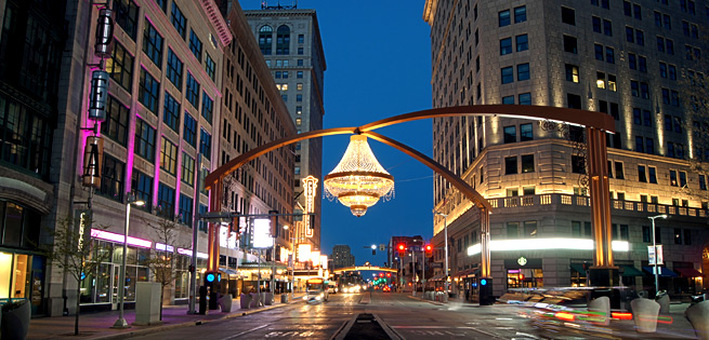By Arbrion Chambliss
 The infamous Playhouse Square chandelier currently holds the record for being the largest outdoor chandelier in the world!
The infamous Playhouse Square chandelier currently holds the record for being the largest outdoor chandelier in the world! Many talents have stepped into the spotlight at Cleveland’s Playhouse Square, from actors in Broadway national tour shows to world-renowned musicians, from professional dancers to comedians. Seeing a performance at Playhouse Square is an opportunity to discover global cultures, share experiences and be inspired by the magic that happens on each theater’s stage. From special events like Dazzle the District to, more recently, the national tour of “Dirty Dancing,” Playhouse Square offers visitors everything they could want out of entertainment and more. Playhouse Square, a non-profit, is the largest performing arts center outside of New York and is located in Cleveland, Ohio.
With this much success, one has to wonder; what happens when something goes wrong during production and what are proper procedures to handle such crises? I sat down with Cindi Szymanski, brand communications manager at Playhouse Square, and she gave me the inside scoop on her experience with crisis management.
Cindi first stressed how important it is to have strong communication within an organization. “No matter the role of the person, you always want to make sure your team is on the same page, that way if anything goes wrong the strong sense of communication is already there.”
Szymanski gave an example of her own experience when a small fire occurred at The Playhouse Square earlier this year in January. “You always want to get the key messages across and although it was small, the news crews were on it, so we made sure our spokesperson was ready to answer all questions,” Szymanski said.
While you may think that you can only relate crises that are similar to the ones at hand, Szymanski argues otherwise. “The crisis doesn’t have to be similar for you to apply the same lessons to it,” Szymanski said. “There have been many times that I was able to take away and learn from crises that have occurred with other companies.””
All in all Szymanski said that there is no way around a crisis occurring. Often it is something that you couldn’t help prevent but you can control the aftermath with the proper team communication. “Teamwork really does make the dream work.”
With this much success, one has to wonder; what happens when something goes wrong during production and what are proper procedures to handle such crises? I sat down with Cindi Szymanski, brand communications manager at Playhouse Square, and she gave me the inside scoop on her experience with crisis management.
Cindi first stressed how important it is to have strong communication within an organization. “No matter the role of the person, you always want to make sure your team is on the same page, that way if anything goes wrong the strong sense of communication is already there.”
Szymanski gave an example of her own experience when a small fire occurred at The Playhouse Square earlier this year in January. “You always want to get the key messages across and although it was small, the news crews were on it, so we made sure our spokesperson was ready to answer all questions,” Szymanski said.
While you may think that you can only relate crises that are similar to the ones at hand, Szymanski argues otherwise. “The crisis doesn’t have to be similar for you to apply the same lessons to it,” Szymanski said. “There have been many times that I was able to take away and learn from crises that have occurred with other companies.””
All in all Szymanski said that there is no way around a crisis occurring. Often it is something that you couldn’t help prevent but you can control the aftermath with the proper team communication. “Teamwork really does make the dream work.”
